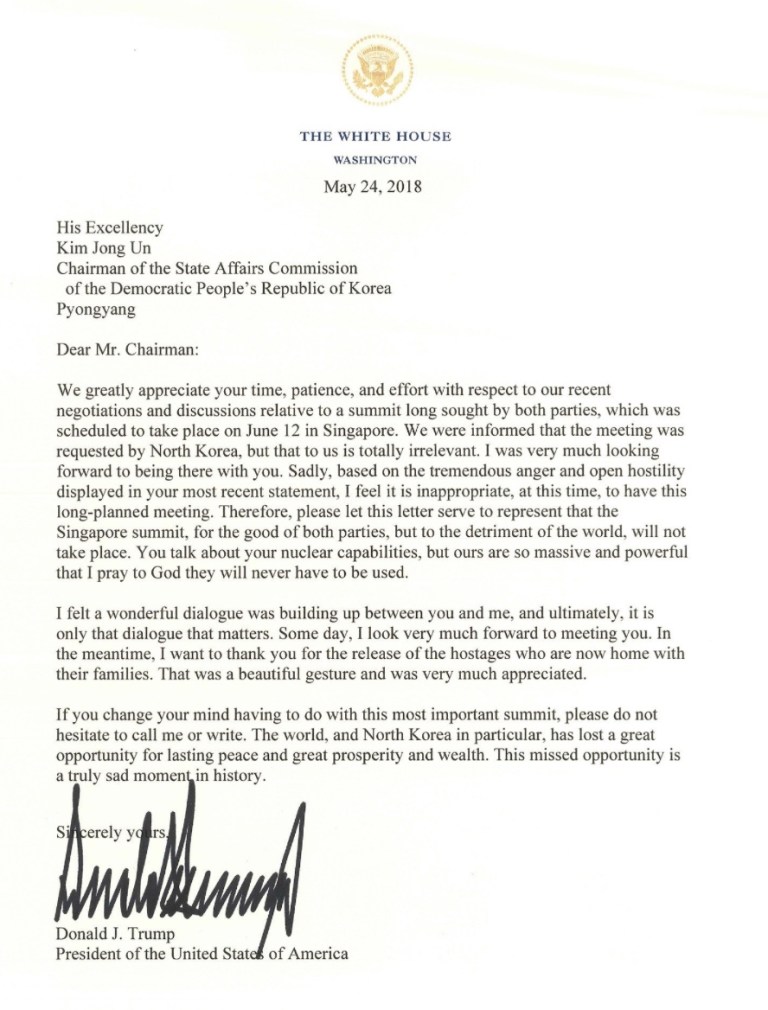President Trump, our behaviorist in chief, schools Kim Jong Un
Kim Jong Un’s temper tantrum upon mention of Libya was predictable, so I’m betting Trump put that out there on purpose to continue using behaviorism on Kim.
 Back in my kids’ pre-school days, one of the moms told a very funny story. She had been struggling to get her three-year-old to put on his shoes before he left the house. He thought this was a terrible idea and would throw a temper tantrum every time she told him to put on his shoes. When the tantrum ended, and he put his shoes on, she would give him a cookie to reward him for putting on his shoes.
Back in my kids’ pre-school days, one of the moms told a very funny story. She had been struggling to get her three-year-old to put on his shoes before he left the house. He thought this was a terrible idea and would throw a temper tantrum every time she told him to put on his shoes. When the tantrum ended, and he put his shoes on, she would give him a cookie to reward him for putting on his shoes.
It was only after going through this routine for several weeks that she realized that her son thought that the tantrum was a prerequisite to the cookie. In other words, she had managed to train him to tantrum first, put on shoes second.
What my friend described was behaviorism gone wrong. Good behaviorism, though, produces better outcomes. Before I go further, I’d better explain what I mean by “behaviorism.” Wikipedia offers a leaden definition:
Behaviorism (or behaviourism) is a systematic approach to understanding the behavior of humans and other animals. It assumes that all behaviors are either reflexes produced by a response to certain stimuli in the environment, or a consequence of that individual’s history, including especially reinforcement and punishment, together with the individual’s current motivational state and controlling stimuli. Although behaviorists generally accept the important role of inheritance in determining behavior, they focus primarily on environmental factors.
Yeah, whatever. Let me try to explain the concept as I understand it:
When you are dealing with a third-party (or a dog), and you want to change that third party’s (or dog’s) behavior, the reality is that, absent brute force, you it’s almost impossible actually to change someone else’s behavior. Like the famous light bulb, they have to want to change. The best that you can do when your current behavior is not effecting a change in the other person or dog is to change your behavior to see if that affects their responses. It’s essentially motivational training.
Dog training offers a good example. The old way of housebreaking dogs involved screaming at the dog if one found a puddle in the house and then rubbing the dog’s nose in it. This effectively terrorized dogs, but that did not mean they associated our behavior with the principle that they should do their business outside. Our psychological cues made no sense to them.
Sensible behaviorism says that we should create conditions within which the dog will succeed: Because dogs do not like to soil their immediate environment, we should keep them in that environment in the lead-up to their anticipated walk to prevent pre-walk accidents. Then, when the time is right, we take them outside and expose them to scent stimuli that will encourage them to do their business. Immediately upon their having done so, we praise them or give them a treat. Our behavior is no longer irrationally punitive but is, instead, purposefully positive. This encourages the dog to change its own behavior and to view the back yard, rather than the living room, as its toilet.
The same holds true in dealing with children. I will deny with the last breath in my body that I was a very good parent. I did figure out, however, that a child who is having a tantrum is demanding attention. The best way to deal with a tantrum, provided that the child is not hurting himself, someone else, or your house, is to ignore the child. The result was that my children never threw tantrums because there was nothing in it for them to do so.
A hallmark of behaviorism is that if you reward a behavior you will get more of it. For the last thirty years, ever since President Clinton’s administration, every time North Korea had a temper tantrum — which took the form of threatening to build nuclear weapons, attack South Korea, or engage in other destabilizing conduct — America rushed in with promises of aid. Over the decades, our presidents and foreign policy mavens trained North Korea that it would receive substantial rewards for bad behavior.
Trump, who is a behaviorist extraordinaire, refused to follow this pattern. Instead of rewarding North Korea for poor behavior, Trump threatened it. When North Korea made threats and demands, Trump didn’t offer money. Instead, he said explicitly that America would hit North Korea twice as hard. That was his behavioral stick to discourage bad behavior.
Because Trump is a master behaviorist, though, he knew that he needed a carrot to elicit good behavior. The carrot was said he engaged in back-and-forth directly with Kim Jong Un, raising Kim’s status, and that he made it clear that if Kim Jong Un would behave sensibly there would be rewards for him. With Trump’s new tactic, which broke the old paradigm, Kim Jong Un also engaged in new tactics: He met with the South Korean leader, released hostages, and closed his nuclear testing site. Oh, and he agreed to meet with President Trump for peace talks.
Even with good behavioral stimulation, though, it still takes time for people’s learned behaviors to change. Kim Jong Un was raised in a tradition that promised him temper tantrums receive rewards. Like the three-year-old who still slips up after having been trained out of temper tantrums, he is still going to have periodic temper tantrums, so the behavioral work needs to be ongoing.
What triggered Kim Jong Un’s most recent temper tantrum was that both Ambassador Bolton and Vice President Pence mentioned Libya. Wow! We all know what happened there. In response to the threat of an American invasion, Qaddafi had agreed to destroy his weapons and behave. Moreover, he kept his promise. Nevertheless, Secretary of State Clinton (arguably at Sidney Blumenthal’s behest) announced that it was time for regime change in Libya, and President Obama support her. It was inevitable that Qaddafi would be murdered, and probably predictable given the world in which he lived and the enemies he’d made that he would be brutally sodomized for good measure. No wonder Kim Jong Un panicked when he heard the word Libya.
The question then becomes how stupid can Bolton and Pence be that both mentioned Libya? I happen to think that neither is stupid, so I must assume that they mentioned Libya on purpose. And this gets back to Trump’s behaviorism: The way I see it, President Trump is still training Kim Jong Un, and anyone else who is paying attention, that if you deal with Trump on his terms he will treat you well. Alternatively, if you do not play Trump’s way, he will treat you badly.
To keep the training going, Trump had his team deliberately speak a word that was a trigger for Kim Jong Un — the word “Libya.” Trump knew how Kim Jong Un would react, which was to throw a temper tantrum and refuse to speak to President Trump.
Instead of rewarding this behavior as past presidents have, President Trump again broke the paradigm. Instead, he repeated his earlier behavioral training with Kim Jong Un — serious threats for bad behavior coupled with promises of substantial rewards (including that huge intangible of good will) for good behavior:
Trump probably had this letter drafted before either Bolton or Pence said a word about Libya. There’s a new sheriff in town and he knows how to motivate people.
One more thing: behaviorism is not a master-slave or boss-subordinate thing. It’s perfectly possible for an employee to train a boss, simply through the employee’s changing his own behavior in a given situation. Should Kim Jong Un ever stumble across this post, I’m not trying to say that he’s a dog and Trump his is master. I am saying, simply, that all of us have a certain amount of control over other people by changing our behavior in a way that inevitably changing their responses.


